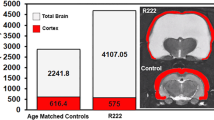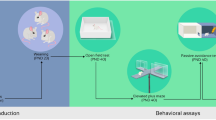Abstract
IN previous reports1–4 from this laboratory, various psychotropic drugs administered to gravid rats resulted in increased neonatal mortality and altered the development and behaviour of the surviving offspring. On the basis of observations1 that learning ability was not altered in offspring after prenatal administration of drugs that affected diencephalic centres, it was suggested that particular drugs may have a specificity of action on developing fœtal brain centres and would alter behavioural processes controlled by these centres. This communication compares three commonly used tranquillizing drugs (reserpine, chlorpromazine and meprobamate) with different pharmacological properties and sites of action, administered to gravid rats for their effect on maze learning ability of the offspring.
This is a preview of subscription content, access via your institution
Access options
Subscribe to this journal
Receive 51 print issues and online access
$199.00 per year
only $3.90 per issue
Buy this article
- Purchase on Springer Link
- Instant access to full article PDF
Prices may be subject to local taxes which are calculated during checkout
Similar content being viewed by others
References
Werboff, J., Gottlieb, J. S., Havlena, J., and Word, T. J., Pediatrics, 27, 318 (1961).
Werboff, J., Gottlieb, J. S., Dembicki, E. L., and Havlena, J., Exp. Neurol., 2, 542 (1961).
Werboff, J., and Dembicki, E. L., J. Neuropsychiat. (in the press).
Werboff, J., and Havlena, J., Exp. Neurol., 6, 263 (1962).
Werboff, J., Havlena, L., and Sikov, M. R., Rad. Res., 16, 441 (1962).
Berger, F. M., in Drugs and Behavior, edit. by Uhr, L., and Miller, J. G. (Wiley, New York, 1960).
Jacobsen, E., Bull. World Health Org., 21, 411 (1959).
Armitage, S. G., J. Comp. Physiol. Psychol., 45, 146 (1952).
Hamilton, H. C., and Harned, B. K., J. Psychol., 18, 183 (1944).
Vincent, N. M., Amer. Psychologist, 13, 401 (1958).
Marx, G. F., Anesthesiology, 22, 294 (1961).
Author information
Authors and Affiliations
Rights and permissions
About this article
Cite this article
WERBOFF, J., KESNER, R. Learning Deficits of Offspring after Administration of Tranquillizing Drugs to the Mothers. Nature 197, 106–107 (1963). https://doi.org/10.1038/197106a0
Issue Date:
DOI: https://doi.org/10.1038/197106a0
This article is cited by
Comments
By submitting a comment you agree to abide by our Terms and Community Guidelines. If you find something abusive or that does not comply with our terms or guidelines please flag it as inappropriate.



